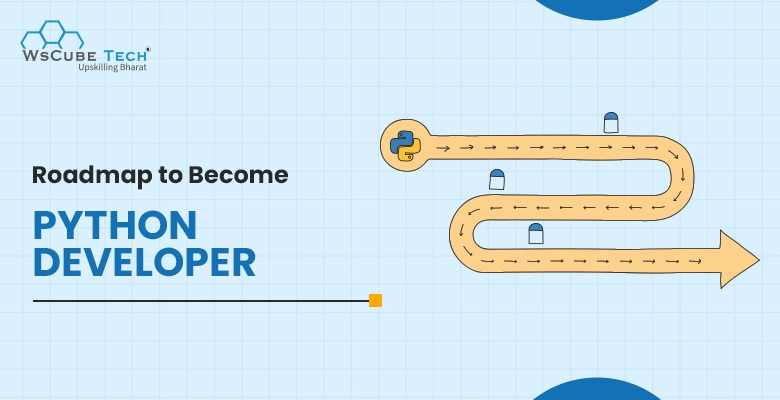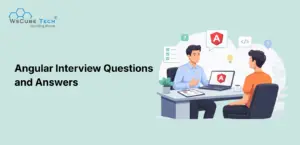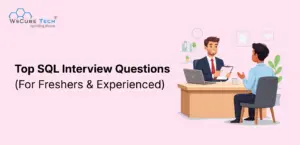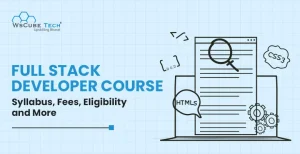Python has proved its worth with its simplicity, versatility, and readability. It has become one of the most powerful programming languages, used across multiple sectors, including data science, machine learning, artificial intelligence, frontend, and backend. It has backed the world's powerful applications and software. No wonder beginners and professionals prefer Python over various other options when it comes to learning a new language as it ensures a promising and secure career.
If you are a tech enthusiast looking to boost your career or kickstart your coding journey, Python is the perfect choice. However, many wonder what the right Python roadmap is for learners.
This blog will explain how to become a Python developer regardless of your experience and skill level. Also, we will talk about the skills required to be a proficient Python programmer and the salary one can expect in this field.
Who Is a Python Developer?
A Python developer is a programmer proficient in creating, managing, and updating applications using the Python programming language. These programmers work as part of a software team to build and deploy applications.
Python is a high-level, general-purpose programming language with simple syntax, making it easy to learn, read, and write. It is used in domains such as scripting, machine learning, automation, data science, artificial intelligence, and web development.
Knowledge of Python frameworks and libraries enables programmers to work collaboratively on data analytics to provide meaningful insights and solutions. Python developers find and fix errors in Python projects using their skills and expertise. They automate tasks and ensure enjoyable user experiences.
Although the job duties and tasks of a Python developer may vary depending on the team size and project, the primary responsibilities include the following tasks:
- Web frameworks for new codes
- Web development
- Data evaluation
- Scripting design
- Scraping the internet
- Automation deployment
Using Python, a simple and versatile language, developers can accomplish varied tasks. However, becoming a Python developer requires a lot of hard work and effort. So, let’s discuss the complete Python developer roadmap in detail.
Recommended Professional Certificates
Data Analytics Mentorship Program
Data Science & AI Mentorship Program
How to Become a Python Developer?
To become a skilled and knowledgeable Python developer, you must learn its basic concepts and consistently practice writing code. You must gain practical experience to have a bright future and make a lucrative career. Here is a detailed Python learning roadmap to guide you at every step of your journey.
1. Learn the Basics
For starters, get familiar with the basics of Python. You can visit the official website of Python to download its latest version. Find online resources, including Python tutorials, e-books, , podcasts, and blogs to learn the basic concepts of Python. Learn how Python works to avoid common mistakes.
Write and run simple Python codes. Check various online projects, review them, and find out how they work. This will help you establish a strong foundation for a strong hold on the language. Your basic understanding must cover topics like variables, loops, conditional statements, data structures, exception handling, functions, modules, data types, etc.
Also, get comfortable with Python syntax, which is simple and based on the English language. This will help you easily get started seamlessly with advanced topics.
2. Determine Your Path
As a Python developer, you can pursue different paths. So, make sure you know which direction you want to move on. Here are the different job roles you can apply for:
-Data Analyst
As a data analyst, you will collect, organize, analyze, and interpret data. With more experience and knowledge, you can handle complex and large projects that involve deep learning algorithms. You can also lead a software development team as a manager, coordinating different tasks, providing guidance, and overseeing the work of team members.
-DevOps Engineer
DevOps Engineers are responsible for automating and streamlining the entire software development process. They take care of creating and managing cloud infrastructure, creating automation scripts, and writing and maintaining scripts.
-Data Scientist
They use Python to develop and implement machine learning models and analyze data. They organize, clean, and prepare data for detailed analysis. Moreover, data scientists optimize predictive models, present massive data clearly so it makes sense, and communicate the results or insights to stakeholders.
-Software Developer
Software developers design, develop, test, and maintain apps using Python. Their job duties include writing clean code, testing the code, finding errors, and fixing bugs. They are also involved in designing software. Software developers work with coders, designers, and front-end developers to create a cohesive product.
-Machine Learning Engineer
You can also work as a machine learning or artificial intelligence engineer. This job involves designing and developing systems that use ML and AI techniques. They also evaluate data, develop models, and test and debug them for enhanced performance.
3. Join a Python Course
Although there is no shortage of learning resources online, it’s recommended to take a full-fledged Python course. It allows you to seek guidance from industry experts, learn in an interactive environment, and gain hands-on experience through assignments. Invest your time and effort in a prep course to learn everything about Python. It is a crucial step in any Python roadmap for beginners as it provides you insights into this field. You can opt for any of the following options to pursue an online Python course:
-Dedicated Websites
There are many online platforms and websites that give learners access to updated study materials and resources, including free tutorials. WsCube Tech is a top-rated platform offering comprehensive courses and tutorials to beginners, helping them learn Python from the ground up.
-University Degree
You can enroll in a university course to explore endless opportunities that may not be available otherwise. It will also allow you to attend seminars, conferences, and events that require a certain level of expertise or education. It also gives you a chance to connect with like-minded people who share similar interests and goals.
-Self-paced Learning
There are various self-paced courses available online so you can learn at your convenience and pace without worrying about deadlines or keeping up with other learners. This enables you to upskill yourself while doing a job or pursuing a different degree. Also, it is affordable and allows you to choose your projects according to your skills and interests.
-Online Videos
YouTube is already a go-to platform for many users to get started with their learning journey. You can find free and high-quality tutorials that can help you brush up on your basic knowledge and skills. There are beginner-friendly videos to teach the basics of coding before you dive deeper into complex topics.
-Online Courses
Online courses are becoming the most common method of learning new skills. WsCube Tech offers several courses to aspirants and professionals to help them start their careers confidently. Our Python course is designed by industry leaders to ensure that you get the best guidance.
4. Explore Frameworks and Libraries
Frameworks are collections of core modules comprising pre-written code and functionality that programmers use to create complex applications. Frameworks reduce the amount of code to be written, so programmers utilize them to build project-specific functionality without starting from zero. This enhances programming efficiency.
Explore and understand Python frameworks and libraries because it will help you speed up the development process and create scalable applications. You will get familiar with the syntax and structure of Python and learn to develop programs. It will also help you select the right framework for your project, and you can make your decision based on the domain you are working on, such as data analytics, machine learning, web development, and artificial intelligence.
For every domain, Python offers a specific set of frameworks and libraries. You can learn about them and choose the one that meets your needs.
-Libraries for Game Development
- PyGame
- Panda3D
- Pyglet
- Kivy
- PyKyra
-Frameworks for Web Development
- CherryPy
- Flask
- Django
- Bottle
-Libraries for Data Science, Data Analyst & Machine Learning
- NumPy
- TensorFlow
- SciPy
- Pandas
- BeautifulSoup4
- SciKit Learn
- Matplotlib
- Keras
- NLTK
- TextBlob
-Libraries for Ethical Hacking
- Cryptography
- Requests
- Scapy
- Python Hash
- pylibnet
- Python-Nmap
-Libraries for Automation Testing
- PyTest
- Selenium
- Pywinauto
- Splinter
- Nose2
5. Create Projects
Work on some projects to gain hands-on experience before you even start your career. This will boost your confidence, and you will have a strong and impressive portfolio showcasing your work and skills. Start with open-source projects that are easily available to use, study, modify, and distribute. These projects require you to implement your knowledge and test your skills. You can identify your strengths and improve your weaknesses.
Try to create high-quality projects that solve real-world problems and demonstrate your experience and expertise. Many recruiters and companies use these projects to assess candidates, so working on projects might give you an upper hand during job interviews.
Also read: Python Course Syllabus: Fees, Duration, Eligibility, Details
6. Develop an Impressive Portfolio
Now that you have worked on a few projects, the next step in your Python full-stack roadmap is to build a strong and impressive portfolio. Based on the frameworks you have selected and the path you want to pursue, work dedicatedly on projects and add them to your portfolio. Show off your work, skills, and creativity by working on multiple small and large-scale projects. This will get the attention of recruiters when you apply for interviews and set you apart from others.
You can build your portfolio in the following ways:
-Freelancing
In freelancing, you work directly for clients who need your services. You are your own boss, decide your work hours and project fees, and interact with clients to understand their requirements. You will understand the kind of work clients want and can hone your skills accordingly, challenging yourself and stepping out of your comfort zone. When freelance projects are added to your portfolio, it proves that you know what you are doing and have the potential to come up with new and innovative ideas.
-Volunteering
It is a rewarding way to build a portfolio and gain insights into the industry. You can also build connections in your field, gain experience working in a team, and acquire advanced technical skills.
-Start a Blog
Create your YouTube channel or start a blog where you showcase and share your knowledge with other learners. You can show your entire learning and programming journey, mentor other aspirants, and communicate your knowledge.
7. Pursue an Internship
An internship is not only a stepping stone in any career, but it is crucial for many reasons. It is the best way to gain real-world experience and get a closer look at how the industry works. You get to test your skills, knowledge, and patience. You learn secondary skills, such as communication, teamwork, collaboration, analytical thinking, and problem-solving.
This is an important part of any Python programmer roadmap as it helps you with networking and making connections that can be useful during job hunting. You work with experienced professionals and can increase your chance of achieving success in your field. Make the most of this opportunity, tap into your full potential, and learn as much as you can.
8. Expand Your Network
Networking is crucial in any field, and Python is no exception. Developing networks and connections with people in your field helps you explore job opportunities and advance your career. You build professional relationships with mentors, recruiters, colleagues, and alumni.
You can expand your network in person through conferences, seminars, workshops, and jobs or online media, such as LinkedIn, forums, online Python communities, etc. Share your ideas, be a part of productive discussions, and don’t hesitate to seek guidance to improve your skills.
Upcoming Masterclass
Attend our live classes led by experienced and desiccated instructors of Wscube Tech.
Skills Required to be a Python Developer
Here are the key skills to become a successful Python developer:
Technical Skills
- Understanding of object-oriented programming (OOPs)
- Core Python
- Python frameworks (Django, Flask, React)
- Object-relational Mapper (ORM)
- Software development best practices and design patterns
- Debugging skills
- Deep learning
- Data scientist and analytics skills
- Version control systems
- APIs , RESTful architecture, and web services
- Multi-process architecture
- Frontend development
- Backend technologies
Soft Skills
- Integration
- Analytical
- Communication
- Problem-solving
- Organization
- Collaboration
- Teamwork
- Logical thinking
Areas To Use Your Python Skills
Python is used across multiple areas and sectors, from web development to machine learning to data science and more. It is easy to learn, even for beginners with no experience in coding. Hence, more and more people are learning Python. It has become a preferred language for companies and developers. So, after understanding the roadmap for Python developer, let’s see the applications of Python in several areas.
1. Data Science
It is among the top job roles in the tech industry, offering lucrative career opportunities. Companies are looking for skilled candidates who can apply advanced analytic techniques to extract valuable information from massive data to help them make informed, data-driven decisions.
If you want to apply in the data science industry, you must have knowledge of statistics and programming, machine learning, and artificial intelligence. You will collect, organize, assess, and present data to stakeholders.
2. Web Development
Web development requires understanding of backend and frontend technologies and APIs. Python works as a server that is used to build server-side of a website. Using its vast set of libraries and frameworks, developers can build the applications quickly and easily.
Moreover, Python developers are responsible for designing, building, maintaining, and testing web applications. As software developers, they design and build software and ensure smooth communication between team members.
3. Automation
Python is the best programming language for automating test cases. It enables us to use automated tools and frameworks. Also, it has a standard library with excellent testing tools, which programmers can use to generate the desired output.
4. Machine Learning
Machine learning focuses on algorithms to extract patterns. Machine learning is the future of the IT world, and Python programmers must acquire this knowledge to make a promising career.
Using Python libraries, developers can process and transform data. Its well-written code eliminates the need for explicitly writing code. As a machine learning engineer, you will create a program to operate a machine. You will implement data modeling and analyze data to find solutions.
5. Data Analysis
The primary job of data analysts is to predict future trends based on the available data and get valuable insights to make informed decisions. They collect, prepare, explore, and model data to make comprehensive reports. For this, they use Python, which is an integral part of data analysis.
Data analysts use Python’s libraries and functions for this. They must acquire data visualization and statistical skills to understand and prepare datasets, develop models, and evaluate data.
6. Data Structures
Data structures and algorithms allow you to arrange data and reduce time and space complexity. To become a part of the DSA sector, you must gain a fair knowledge of Python programming.
7. Game Development
Game development is an effective way to master Python. Once you become an expert game developer, you can be assured of a high-paying job and secure career. You must know the tools and technologies required to develop games.
You must be able to create exciting and innovative games, working on its frontend and backend elements to build the final product. Try to create games that focus on fun and learning simultaneously.
Salary of a Python Developer in India
According to AmbitionBox, the average annual salary of a Python developer in India is ₹5.7 Lakhs. After gaining a few years of experience and expertise, you can apply for senior roles, like team leader or project manager, and earn more than ₹15 LPA.

FAQs- Python Developer Roadmap
You must take a Python course online to learn Python and acquire the necessary skills. A degree in computer science or a related field is beneficial. You must also have knowledge of Python frameworks like HTML, CSS, and Django, which you can learn through tutorials or a full-fledged Python course. Gain hands-on coding experience by doing an internship or creating small projects, as it will add value to your portfolio.
To start your career as a Python developer, first learn the basics, such as syntax, variables, functions, data types, and more. Understand data structures and algorithms and explore frameworks. Learn advanced concepts and apply your knowledge by creating open-source projects. This will also help you hone your skills. Create a strong portfolio, get practical experience, and start applying for jobs.
The time required to learn and master Python depends on your learning pace, capacity, consistency, and practice. If you put in all the hard work, practice code regularly, and build projects, you can surely learn Python in three months.
If you have a knack for coding and excitement to learn programming, then Python is a good option. If you have technical skills and interests and dream of creating powerful applications, then Python is a great career choice.
There are many Python programmers who may not have a degree but are doing great in their field. They focused on gaining skills and knowledge through online courses, tutorials, and projects. Many employers also value skills and expertise over degrees. So, if you think you have everything it takes to be a Python developer, you will achieve your goals even without a degree.
Python is a beginner-friendly and simple language, so learning it is easy. However, to be a skilled Python developer, you need patience and consistent practice, which can sometimes be challenging. So, focus on your target, and you will soon be an expert Python developer.
Conclusion
Python is easy to learn and understand. It is scalable, flexible, and dynamic, opening the gate for endless opportunities for better career growth. Python is a go-to solution for anyone who is about to start their coding journey and is confused about where to begin. It ensures a bright and secure future. Once you master Python concepts, you can work in various lucrative fields, including artificial intelligence, data science, machine learning, automation, and web development. So, without further ado, enroll in a reliable Python course and get a step closer to your dream job.
Read More Blogs Topics









Leave a comment
Your email address will not be published. Required fields are marked *Comments (0)
No comments yet.